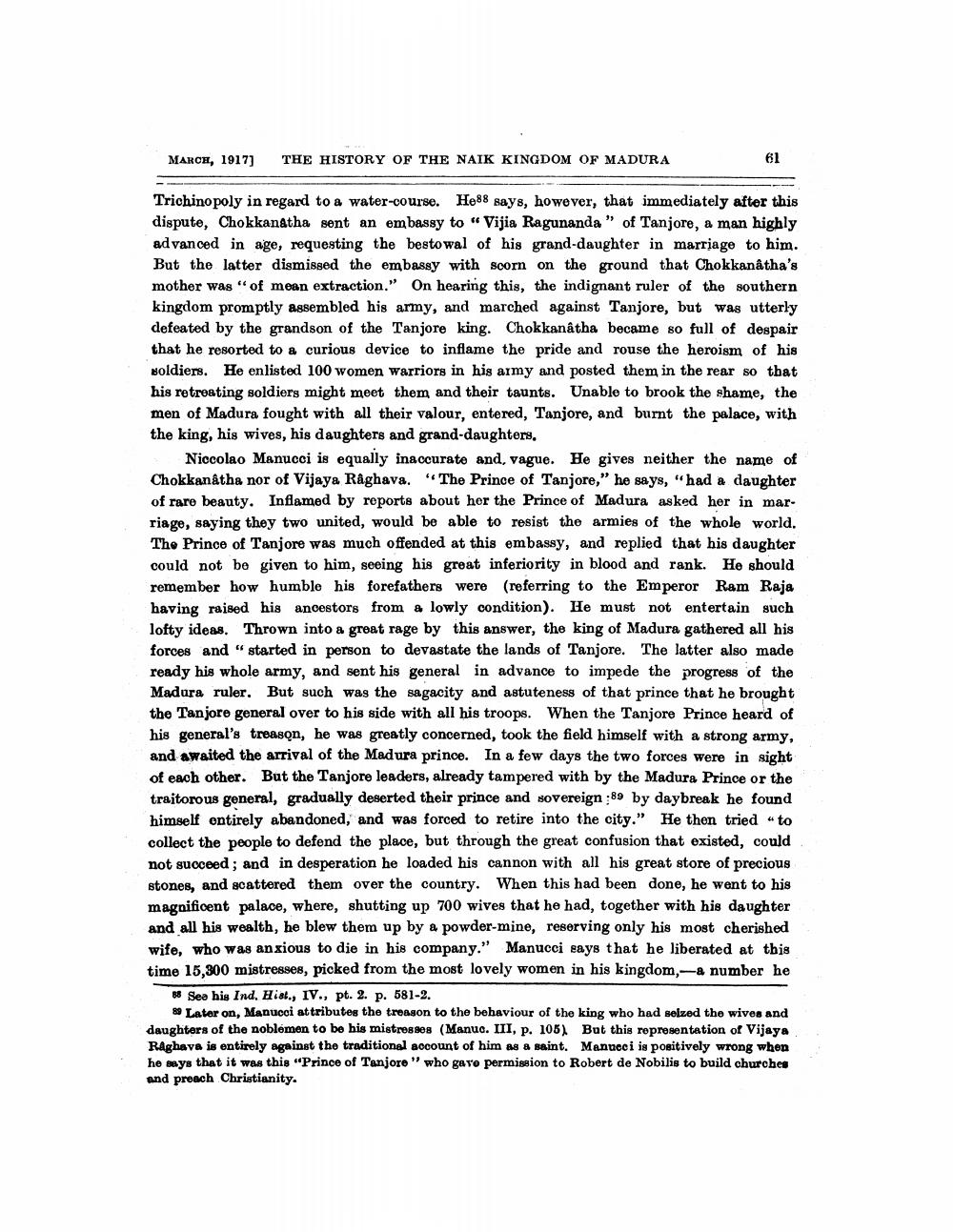________________
MARCH, 1917)
THE HISTORY OF THE NAIK KINGDOM OF MADURA
61
Trichinopoly in regard to a water-course. He88 says, however, that immediately after this dispute, Chokkanatha sent an embassy to "Vijia Ragunanda" of Tanjore, a man highly advanced in age, requesting the bestowal of his grand-daughter in marriage to him. But the latter dismissed the embassy with scorn on the ground that Chokkanatha's mother was "of mean extraction." On hearing this, the indignant ruler of the southern kingdom promptly assembled his army, and marched against Tanjore, but was utterly defeated by the grandson of the Tanjore king. Chokkanatha became so full of despair that he resorted to a curious device to inflame the pride and rouse the heroism of his soldiers. He enlisted 100 women warriors in his army and posted them in the rear so that his retreating soldiers might meet them and their taunts. Unable to brook the shame, the men of Madura fought with all their valour, entered, Tanjore, and burnt the palace, with the king, his wives, his daughters and grand-daughters.
Niccolao Manucci is equally inaccurate and, vague. He gives neither the name of Chokkanátha nor of Vijaya Raghava. "The Prince of Tanjore," he says, "had a daughter of rare beauty. Inflamed by reports about her the Prince of Madura asked her in marriage, saying they two united, would be able to resist the armies of the whole world. The Prince of Tanjore was much offended at this embassy, and replied that his daughter could not be given to him, seeing his great inferiority in blood and rank. He should remember how humble his forefathers were (referring to the Emperor Ram Raja having raised his ancestors from a lowly condition). He must not entertain such lofty ideas. Thrown into a great rage by this answer, the king of Madura gathered all his forces and "started in person to devastate the lands of Tanjore. The latter also made ready his whole army, and sent his general in advance to impede the progress of the Madara ruler. But such was the sagacity and astuteness of that prince that he brought the Tanjore general over to his side with all his troops. When the Tanjore Prince heard of his general's treason, he was greatly concerned, took the field himself with a strong army, and awaited the arrival of the Madura prince. In a few days the two forces were in sight of each other. But the Tanjore leaders, already tampered with by the Madura Prince or the traitorous general, gradually deserted their prince and sovereign :89 by daybreak he found himself entirely abandoned, and was forced to retire into the city." He then tried to collect the people to defend the place, but through the great confusion that existed, could not succeed; and in desperation he loaded his cannon with all his great store of precious stones, and scattered them over the country. When this had been done, he went to his magnificent palace, where, shutting up 700 wives that he had, together with his daughter and all his wealth, he blew them up by a powder-mine, reserving only his most cherished wife, who was anxious to die in his company.” Manucci says that he liberated at this time 15,300 mistresses, picked from the most lovely women in his kingdom,-a number he
Sea his Ind. Hisl., IV., pt. 2. p. 581-2.
89 Later on, Manucci attributes the treason to the behaviour of the king who had seized the wives and daughters of the noblemen to be his mistresses (Manuc. III, p. 105) But this representation of Vijaya Raghava is entirely against the traditional account of him as a saint. Manucci is positively wrong when he says that it was this "Prince of Tanjore " who gavo permission to Robert de Nobilis to build churches and preach Christianity.




